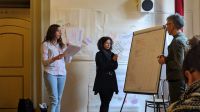Empowering Migrants Towards the Future: TRAINING FOR TRAINERS Activity of the ENSEMBLE Project in BOLOGNA
ENSEMBLE consorium travelled to Bologna on January 29th, 30th and 31st for the “Training for Trainers” session of the project ENSEMBLE – Expectations and Non-Formal Skills to Empower Migrants and Boost Local Economy, co-founded by the Erasmus+ Programme of the European Commission.
Ensemble aims to map training needs and develop innovative tools to improve the skills of migrants in Key Competence 7 – “Sense of Initiative and Entrepreneurship” in three fields: Tourism/Catering, Manufacturing, Constructions, involving 200 migrants and 150 educators at VET level.
The project developed NFIL – Non-Formal and Informal Learning mechanism – focusing on migrants’ needs that will help VET’s educators to identify and assess the NFIL professional competences of migrant groups, as well as allowing migrants to play a central role in the integration process.
The Ensemble NFIL mechanism uses media, e.g. pictures, videos, sequences of images, allowing educators to identify migrant areas and degrees of competence. Moreover, it allows educators to profile migrants’ professional skills set, in order to direct them towards the most suitable VET offer (custom solutions) for employment.
Cross Cultural alignment tools during the 3 training days were introduced to better manage orientation interview with migrants who find themselves in situations of vulnerability due to their migration pathway, poor linguistic skills and insufficient knowledge of the context of arrival. Also, the tools created by the ENSEMBLE project were discussed in work group and with the “World Café” techniques in order for the organisations to best use and adapt them according to their needs. The partners’ trainers showed a practical approach participating in the linguistic tandem along with a group of migrants inserted in an inclusion process.






 Demo
Demo







